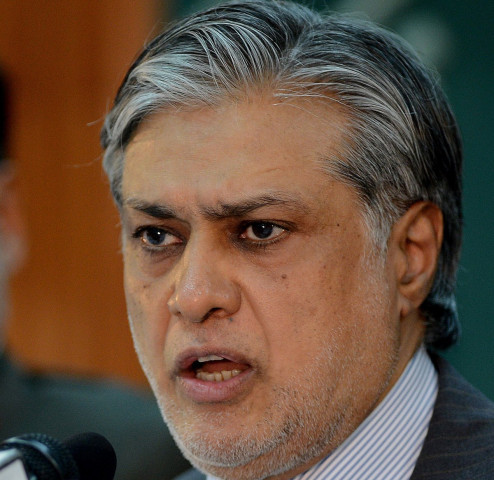New bailout: Pakistan, IMF agree on $5.3b package
Fund’s board will endorse programme only after govt places curbs on provincial spending.

Finance Minister Ishaq Dar. PHOTO: AFP
The bailout programme’s approval by the lending institution’s executive board, however, hinges on the country’s ability to implement painful measures, such as placing restraints on provincial expenditures for the first time.
“The government of Pakistan and IMF have reached an agreement for a three-year programme of at least 5.3 billion dollars,” announced Finance Minister Ishaq Dar at a joint news conference with IMF mission chief Jeffery Franks.
The minister said the loan would be extended under the ‘extended fund facility’, which carries a floating interest rate – currently at 3% – and a repayment period of 10 years, including a four-year grace period. He added that the tranches of the loan will be disbursed in a manner which would allow the country to return earlier loans obtained from the IMF.

Dar’s announcements will sooth the rattled investors and markets, and improve the country’s tainted image in the eyes of the world. But this will not come without pain.
With the programme, the country will enter a new era of slow growth, high inflation and rising unemployment due to deep fiscal adjustments and increasing cost of utilities – a hallmark of every IMF programme, but the price of sheer mismanagement of the country’s economy over the past five years.
The institution’s management and executive board are expected to take a decision on the programme’s approval in the first week of September.

Before the IMF board’s meeting, however, “Pakistan will have to take fiscal actions, announce a new energy plan, the State Bank of Pakistan will have to take new monetary policy measures and the Council of Common Interests needs to approve parts of the package,” said Jeffery Franks.
CCI will have to approve the stipulations of the programme which call for placing restraints on provincial expenditures. If the council approves the deal, the provinces will be bound to make savings from their respective budgets in order to keep the overall budget deficit at a targeted level.
Analysts, however, believe the federal government will have a tough time trying to convince provinces – especially Khyber-Pakhtunkhwa and Sindh, where PML-N’s rivals PTI and PPP have formed governments – to curb spending.
The other tough condition for the current fiscal year is to reduce the budget deficit to 6% of the gross domestic product or Rs1.56 trillion, against 6.3% announced in the new budget. Considering the country closed the last fiscal year at 9% of GDP or Rs2.1 trillion, a fiscal adjustment of 3% seems next to impossible, said the analysts.
The government will also have to privatise some public sector enterprises, particularly power distribution companies, and restructure others as part of the programme’s conditions.
Talking to reporters, Dar said the programme was aimed at stabilising Pakistan’s economy and creating an environment suitable for a revival of growth.
“The PML-N inherited a broken economy,” he asserted once again, adding that the country has to deal with huge payment liabilities because of the previous government. He stressed that the country could not afford to default on its international obligations as the country has to return $3 billion to the IMF this year.
The finance minister lamented that resources from the previous loan were not efficiently utilised, as a result of which sufficient reserves are not available to service them.
“We have negotiated a programme, which is homegrown and entirely of our own making,” he claimed.
Dar also prepared the nation for difficult times ahead, saying “A better tomorrow dawns only when requisite pains are borne today.”
Meanwhile, the IMF mission chief said reducing the budget deficit, phasing out power subsidies and restructuring and privatising public sector enterprises will be difficult decisions for the new government.
“A determined effort is required to improve medium-term growth and move toward sustainable fiscal and external positions. This requires a strong political consensus, in the central government as well as in the provincial governments, on a medium-term program of fiscal consolidation anchored on an efficient and equitable tax system,” he added.
Franks held the new budget as a step in the right direction and said the PML-N government has agreed to complement this with additional steps to achieve a substantial deficit reduction at the beginning of the programme.
Published in The Express Tribune, July 5th, 2013.



1724319076-0/Untitled-design-(5)1724319076-0-208x130.webp)















COMMENTS
Comments are moderated and generally will be posted if they are on-topic and not abusive.
For more information, please see our Comments FAQ